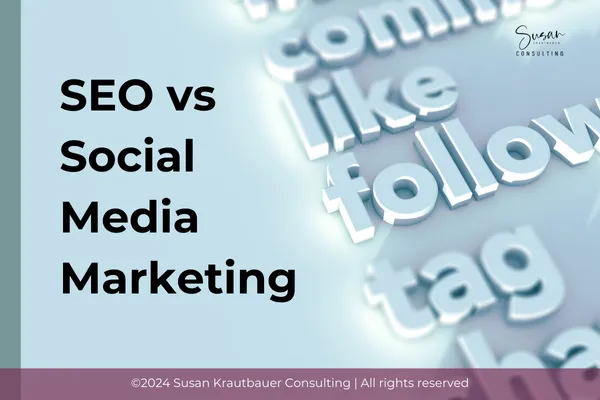Biz Builder - Go Further, Faster
marketing • Entrepreneurship • Startups • GROWTH • LEADERSHIP
Biz Builder - Go Further, Faster
marketing • Entrepreneurship • Startups • GROWTH • LEADERSHIP
Tips, tools, and inspiration for aspiring and growth stage entrepreneurs. Dive in for insights on marketing, leadership, and tools to help build your business.

SEO vs. Social Media Marketing - Which is Better?

Before we dive into this SEO vs. social media showdown, let me tell you why I’m worth listening to. I’ve been honing my marketing chops for over 25 years, starting with our own boutique marketing strategy and trade show design firm. Over the years, I’ve seen trends come, go, and come back again (hello, email newsletters!).
And while I’m dishing out expertise, let me also confess: I’m an unabashed lover of Mini Australian Shepherds. These dogs are smart, energetic, and endlessly loyal—kind of like a good marketing strategy. So, whether you’re looking to fetch more traffic or herd your audience to conversion, I’ve got you covered.
Now, let’s dig into the age-old question: Which is better—SEO or social media marketing?
Targeting Your Audience: The Social Media Bullseye 🎯
If you’re looking for precision, social media is like using a laser pointer (or, for my fellow mini-Aussie lovers, a squeaky toy) to find your perfect customer. Platforms like Facebook, Instagram, and LinkedIn let you target ads to specific demographics. Want to sell artisanal dog treats to millennial pet parents? Social media’s got you covered.
SEO, meanwhile, is more like casting a net into the ocean. It’s effective, but it’s harder to guarantee you’ll land exactly what you’re fishing for. SEO helps people find you based on search terms (aka "keywords"), but it doesn’t let you zero in on their hobbies or favorite Netflix shows.
Pro Tip: Social media ads are a great starting point for reaching niche audiences. Want to learn more? Check out Sprout Social’s guide to targeting.
Effort: The Long Haul vs. the Daily Grind
Social media marketing is like owning a mini-Aussie—it requires daily attention and lots of energy. You’ll need to consistently post, engage with your audience, and stay on top of trends (because nothing goes viral faster than yesterday’s news).
SEO, on the other hand, is more like planting a tree. It takes time to grow, but once it’s established, it provides shade (or traffic) with less effort. Ranking your website on search engines can take months, but the rewards are long-lasting—like those quiet evenings when your Aussie finally tires out.
Helpful Hack: Tools like Buffer or the all-in-one marketing CRM platform that I use, can take the pressure off your social media game by automating posts.
Content: The Right Stuff
When it comes to content, it’s not a one-size-fits-all game.
For SEO, long-form content is king. Think blog posts that dive deep, like “The Ultimate Guide to Mini Aussie Training (And Why They’re Smarter Than Cats).” These articles keep readers on your site and help you rank higher on Google.
Social media, on the other hand, thrives on snackable content—short videos, eye-catching images, and captions that make people stop scrolling. If your content can make someone laugh, cry, or feel something in 5 seconds, you’ve nailed it.
Want tools to make this easier? Try Canva for social graphics and Yoast SEO for optimizing your website.
SEO and Social Media: The Dream Team
Here’s the truth: you don’t have to choose. In fact, you shouldn’t.
🥪 Think of SEO and social media as peanut butter and jelly —each good on its own, but amazing together. Here’s why:
Social media boosts SEO: When people share your blog posts, search engines notice.
SEO helps social media: High-quality content on your site gives you something to share.
Both drive traffic: Whether people find you through Google or a viral Instagram post, the goal is the same: getting them to your website.
The Final Verdict
So, which is better: SEO or social media marketing? The answer is simple: both!
Use SEO to create evergreen content that builds traffic over time.
Use social media to engage with your audience in real-time and show off your brand’s personality.
By combining these strategies, you’ll maximize your chances of growing your business.
Craving more details? Check out my blog post titled: SEO or PPC: Which Strategy Delivers More Bang for Your Buck?
And remember: marketing is like training a mini Aussie—it takes consistency, patience, and the right tools. But once you get it right, the results are nothing short of amazing.

SEO vs. Social Media Marketing - Which is Better?

Before we dive into this SEO vs. social media showdown, let me tell you why I’m worth listening to. I’ve been honing my marketing chops for over 25 years, starting with our own boutique marketing strategy and trade show design firm. Over the years, I’ve seen trends come, go, and come back again (hello, email newsletters!).
And while I’m dishing out expertise, let me also confess: I’m an unabashed lover of Mini Australian Shepherds. These dogs are smart, energetic, and endlessly loyal—kind of like a good marketing strategy. So, whether you’re looking to fetch more traffic or herd your audience to conversion, I’ve got you covered.
Now, let’s dig into the age-old question: Which is better—SEO or social media marketing?
Targeting Your Audience: The Social Media Bullseye 🎯
If you’re looking for precision, social media is like using a laser pointer (or, for my fellow mini-Aussie lovers, a squeaky toy) to find your perfect customer. Platforms like Facebook, Instagram, and LinkedIn let you target ads to specific demographics. Want to sell artisanal dog treats to millennial pet parents? Social media’s got you covered.
SEO, meanwhile, is more like casting a net into the ocean. It’s effective, but it’s harder to guarantee you’ll land exactly what you’re fishing for. SEO helps people find you based on search terms (aka "keywords"), but it doesn’t let you zero in on their hobbies or favorite Netflix shows.
Pro Tip: Social media ads are a great starting point for reaching niche audiences. Want to learn more? Check out Sprout Social’s guide to targeting.
Effort: The Long Haul vs. the Daily Grind
Social media marketing is like owning a mini-Aussie—it requires daily attention and lots of energy. You’ll need to consistently post, engage with your audience, and stay on top of trends (because nothing goes viral faster than yesterday’s news).
SEO, on the other hand, is more like planting a tree. It takes time to grow, but once it’s established, it provides shade (or traffic) with less effort. Ranking your website on search engines can take months, but the rewards are long-lasting—like those quiet evenings when your Aussie finally tires out.
Helpful Hack: Tools like Buffer or the all-in-one marketing CRM platform that I use, can take the pressure off your social media game by automating posts.
Content: The Right Stuff
When it comes to content, it’s not a one-size-fits-all game.
For SEO, long-form content is king. Think blog posts that dive deep, like “The Ultimate Guide to Mini Aussie Training (And Why They’re Smarter Than Cats).” These articles keep readers on your site and help you rank higher on Google.
Social media, on the other hand, thrives on snackable content—short videos, eye-catching images, and captions that make people stop scrolling. If your content can make someone laugh, cry, or feel something in 5 seconds, you’ve nailed it.
Want tools to make this easier? Try Canva for social graphics and Yoast SEO for optimizing your website.
SEO and Social Media: The Dream Team
Here’s the truth: you don’t have to choose. In fact, you shouldn’t.
🥪 Think of SEO and social media as peanut butter and jelly —each good on its own, but amazing together. Here’s why:
Social media boosts SEO: When people share your blog posts, search engines notice.
SEO helps social media: High-quality content on your site gives you something to share.
Both drive traffic: Whether people find you through Google or a viral Instagram post, the goal is the same: getting them to your website.
The Final Verdict
So, which is better: SEO or social media marketing? The answer is simple: both!
Use SEO to create evergreen content that builds traffic over time.
Use social media to engage with your audience in real-time and show off your brand’s personality.
By combining these strategies, you’ll maximize your chances of growing your business.
Craving more details? Check out my blog post titled: SEO or PPC: Which Strategy Delivers More Bang for Your Buck?
And remember: marketing is like training a mini Aussie—it takes consistency, patience, and the right tools. But once you get it right, the results are nothing short of amazing.
work with me
follow
Krautbauer Enterprises dba Susan Krautbauer Consulting - ©2026 All Rights Reserved - Terms of Use - Privacy - Refunds - Disclaimers -












